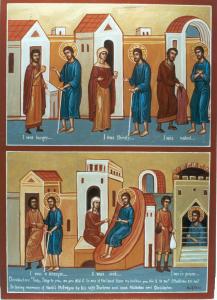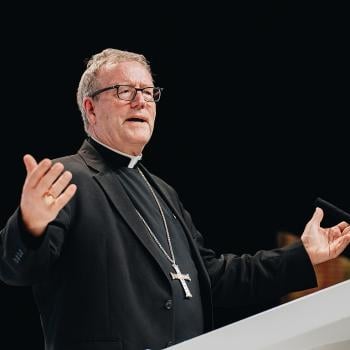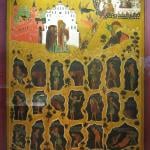
Throughout Scripture, and especially in the works of the prophets, we are told that God stands on the side of the poor, the widow, and the oppressed. Those who not only ignore the plight of those who are vulnerable, but make it worse, stand against God and God’s justice. If they do not repent, if they do not repair the harm they have done, God’s justice will come upon them, and they will experience the full force of the iniquities they have done coming back upon themselves. Such justice can be seen as a kind of karmic reaction, that is, the consequences of their actions come from the actions themselves. Those who would exploit, terrorize, abuse, denigrate, or diminish the poor and needy, be it those who have lost all their wealth and resources (and their homes), or those who come to a new place, searching for compassion, and a new, better way of life for themselves and their families, will eventually experience the fruit of their action, either sometime during their temporal existence, or when they come face to face with Christ at the last judgment. Thus, the Armenian Oft-Repeated Discourses, following the prophetic tradition in Scripture, warns:
Those who defile sacred things with unholy behavior and despise the law concerning the right of the homeless and mercy to those in need, and falsely hold on to the truth and ignore the tears of the oppressed, refuse to hear the cry of the detainees, and do similar evil things, for these (evils) the righteous Judge will deliver them to famine, to the sword, and to captivity and oblivion. [1]
The prophets knew that just as God had heard the cries of the people of Israel in Egypt, so God hears the cries of the poor and needy in every age. Many of them, like Jeremiah, warned kings and priests that they risked bringing destruction upon themselves, and to the people of Israel, if they did not change their ways. They also warned against the belief that God would continue to bless them no matter what they did, as many false prophets suggested; instead, they pointed to the way the covenant with God had been made, where God promised blessings only to those who kept to the ways of the covenant, ways which included treating the poor and vulnerable with respect.
We need to keep this in mind so that we realize that no country is so blessed by God that if it is willing to abandon or oppress those in need, that it will not face the consequences of its actions. Those who embrace injustices will find those injustices embracing them in return. Yes, justice often appears to be slow in coming, but that is to give everyone a chance to repent and do better. That is, God not only wants countries, and their leaders, to change their ways, to stop doing the evil which they are doing, but also to fix the harm which has been done. To be a Godly country, they must then become actively seeking those in need, and giving them the proper help they need:
What could be more suited to faith, what more helpful to compassion, than assuaging the poverty of those in need, undertaking care of the sick, succoring needs of the brethren, and recalling our own condition in the distress of others. [2]
The more we help the poor, the needy, and the oppressed, the more we show honor and respect to them, the more we honor God through them. We must respect their dignity, knowing that such dignity is both spiritual and material. This is why we must not neglect their material needs by saying the body is worthless and so we should not be so concerned as to what happens to it. It is not worthless. The Christian faith, with its teaching of the incarnation, and the resurrection of the body, points to the fact that the whole person, including their body, is to be respected and will have a place in the kingdom of God. Since helping people attain their material (and bodily) needs is one way to show them respect, when those needs are neglected, or worse, actively denied to them, their dignity and honor is undermined. If we say the only thing which matters is to help them spiritually as an excuse to ignore their material needs, we show we have not properly understood the incarnation and the value of the material world (and with it, the body). We have embraced, instead, some element of Gnosticism and its rejection of the material world. Thus, when a society undermines the dignity of those in material need, it cannot be said to follow Christian values, as it refuses to acknowledge the value of the body. Origen, on the other hand, shows us what the right Christian spirit should be like when he wrote “If you ever see a poor person being harmed, do something about it. When that person is harmed, stand by him. He is despised because of poverty; the just person is at his side.” [3]
We must, therefore, be careful, and pay attention to what is happening around us. We should pay extra attention to social justice, recognizing that social justice, as it is tied with the body, is tied to the integral good of the whole person. We must be holistic, and not deny the good of the body, or the fact we need to take care of its needs. And we must do this as a society:
A society that allows thousands of homeless people to roam the streets with no protection for their bodies; that spends, on the average, more for the last week of a dying elderly person’s hospital care than for the medical needs of the first ten years of a child’s life; that refuses in international congresses to join other nations in protecting biodiversity and limiting chemicals that contribute to global warming: this society hates the body, human bodies, and all other animal and plant bodies that make up the body of our planet.[4]
No society which shows great contempt to the poor and oppressed can be said to represent Christian values. No matter how much they like to say they are Christian, no matter how much they will true to use the Christian faith, and say they will be blessed by God, they stand against God and resemble the false prophets which the prophets in Scripture criticized time and time again.
[1] Moralia et Ascetica Armeniaca: The Oft-Repeated Discourses. Trans. Abraham Terian (Washington, DC: CUA Press, 2021), 124 [Discourse 7].
[2] St Leo the Great, Sermons. Trans. Jane Patricia Freeland CSJB and Agnes Josephine Conway SSJ (Washington, DC: CUA Press, 1996), 43 [Sermon 10].
[3] Origen, Homilies on the Psalms: Codex Monacensis Graecus 314. Trans. Joseph W. Trigg (Washington, DC: CUA Press, 2020), 445 [Homily Psalm 81].
[4] Sallie McFague, The Body of God: an Ecological Theology (Minneapolis: Fortress Press, 1993), 24.
Stay in touch! Like A Little Bit of Nothing on Facebook.
If you liked what you read, please consider sharing it with your friends and family!
N.B.: While I read comments to moderate them, I rarely respond to them. If I don’t respond to your comment directly, don’t assume I am unthankful for it. I appreciate it. But I want readers to feel free to ask questions, and hopefully, dialogue with each other. I have shared what I wanted to say, though some responses will get a brief reply by me, or, if I find it interesting and something I can engage fully, as the foundation for another post. I have had many posts inspired or improved upon thanks to my readers.
















